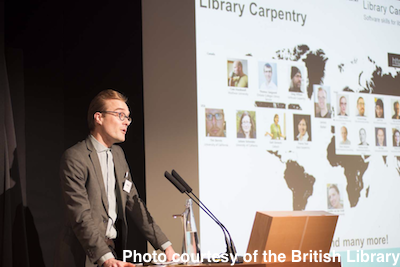Library Carpentry: software skills workshops for librarians
Posted on 24 February 2017
Library Carpentry: software skills workshops for librarians
 By James Baker, Lecturer in Digital History and Archives, University of Sussex, and Software Sustainability Institute Fellow
By James Baker, Lecturer in Digital History and Archives, University of Sussex, and Software Sustainability Institute Fellow
Librarians play a crucial role in cultivating world-class research and in most disciplinary areas today world-class research relies on the use of software. Established non-profit organisations such as Software Carpentry and Data Carpentry offer introductory software skills training with a focus on the needs and requirements of research scientists. Library Carpentry is a comparable introductory software skills training programme with a focus on the needs and requirements of library professionals: and by software skills, I mean coding and data manipulation that go beyond the use of familiar office suites. As librarians have substantial expertise working with data, we believe that adding software skills to their armoury is an effective and important use of professional development resource that benefits both library professionals and their colleagues and collaborators across higher education and beyond.
In November 2015 the first Library Carpentry workshop programme took place at City University London Centre for Information, generously supported by the Software Sustainability Institute as part of my 2015 Fellowship. Since then 21 workshops have run in 7 countries across 4 continents and the Library Carpentry training materials have been developed by an international team of librarians, information scientists, and information technologists. Our half-day lessons, which double up as self-guided learning materials, now cover the basics of data and computing, using a command line prompt to manipulate data, version control in Git, normalising data in OpenRefine, working with databases in SQL, and programming with Python.
What distinguishes these lessons from other learning materials are that the exercises and use cases that frame Library Carpentry are drawn from library practice and are based on data familiar to librarians: in most cases, open datasets of publication metadata released under an open licence by the British Library. Library Carpentry then is as much about daily practice as it is about novelty, about dealing with what is front of us today as much as about preparing us for what is coming.
These lessons and everything we do is in the commons, for the commons, and are not tied to any institution or person. We are a community effort built and maintained by the community. For more on Library Carpentry and our future plans, see our recent article in LIBER Quarterly (Baker et al. Library Carpentry: software skills training for library professionals. 2016. DOI) and our website.
The Learning and Teaching Award given to Library Carpentry at the 2016 British Library Labs Awards has enabled us to extend this community. In November we launched a call for Library Carpentry workshops seeking financial support. We were humbled by the volume and diversity of the responses received and are delighted to be able to fund two very different workshops that will reach very different communities of librarians. The first is a collaboration between Somerset Libraries Glass Box Project, {Libraries:Hacked}, and Plymouth Libraries for a Library Carpentry workshop that will target public, academic, and specialist librarians. The second workshop will take place at University of Sheffield and will be coordinated by the White Rose Consortium for the benefit of university librarians across the region. Details of these events will be advertised at librarycarpentry.github.io in due course, along with four or five Library Carpentry workshops that were unable to fund but that will still enjoy logistical support from members of the Library Carpentry community.
Library Carpentry has taken great strides in a short period of time. We continue to maintain and update our lesson materials to ensure that they fit with library practice and we are working closely with Software Carpentry and Data Carpentry to map out a future direction for Library Carpentry that meets the needs of this valuable community. We are always looking for people to bring their expertise and perspective to this work. So if you want to get involved in any capacity, please post something in our Gitter discussion forum, raise a issue on or suggest an edit to one of our lessons, contact us via Twitter, or request support with a workshop. We'd love to hear from you.

